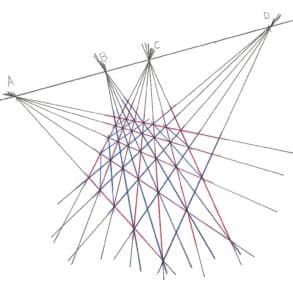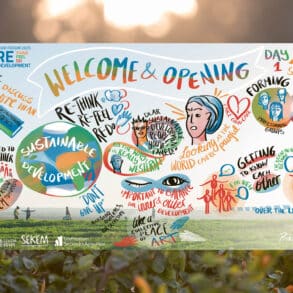The most important thing is not whether conflict or communion arises in interpersonal relationships but, rather, whether a real encounter takes place, whether a real relationship develops. Bodo von Plato describes elements of an ethics of relationship through the transformation and redefinition of values and the creation of a new inner place.
Like a child who perceives their surroundings and forges a personality in relation to it, humans were and are dependent on their environment to impart ethical values. The individual person finds it difficult even today to recognise—let alone transform—the value judgements that are imprinted in them from the outside. It seems natural and “normal” to fit into a normative framework that specifies what to do and what not to do, what is good and what is bad. The idea of an ethics in which values are formed anew, in and from the creative individual, has preoccupied thinkers from the twentieth century to the present day. Hannah Arendt made a special contribution in this respect with many of her works and essays.
Arendt impressively sets out how human beings need externally imposed moral rules and how they can go beyond them. She shows how the individual will and the associated capacity to determine what is “good and evil” using our own powers emerge in human development. She describes the twentieth century as an era in which profound change took place. For a functioning society with a human face, it is no longer enough for the individual to follow moral rules that have been passed down through tradition and custom—the totalitarian aberrations of highly cultured societies are an undoubted indication of this. Rather, the aim of development must be for the individual person to create their own individual ethics that are not dictated by society and yet are consistent with a greater order. Arendt does not advocate an anarchic state in which there would no longer be any generally valid moral rules but rather has confidence in the development of the human being that enables them to create their own moral values in such a way that they enable and support their own life and the life of those around them in a meaningful, that is, free way. It is not difficult to recognise the proximity of her thinking to Rudolf Steiner’s concept of ethical individualism.
But how can this paradigm shift be realised, such that it is no longer ethics that determines people but the individual person that determines ethics? This paradigm shift is anything but self-evident. The first difficulties already appear when a child begins to express opinions that differ from those around them. A parental home that shows unbiased interest and subsequent critical attention to the child and young person is an important foundation on this path to freedom. In this context, the principle of self-determination gains a value that can hardly be overestimated. It is constitutive in Waldorf education and is probably the ideal underlying all reflected-on pedagogy today, in that it no longer seeks to imprint patterns and norms on the growing person, but wants to awaken in them the ability to really take their lives into their own hands one day and to help shape their social environment.
However, a realistic view of the current world situation makes it seem impossible that for individual person to create values that serve or even constitute an “open society” (Karl Popper). We do not seem to be in a position to guarantee social justice, nor to preserve the environment, let alone feed the whole of humanity. But this observation is no reason to throw trust in the self-creative individuality overboard. Rather, it is particularly worthwhile, especially against this background, to look at which upbringing, which experiences, and which scientific or artistic approaches promote the creation of individual values. Precisely because fundamentalists are engaged in fierce battles over the “correct” worldview or religion, war zones and peace zones are becoming increasingly intertwined, and the streams of refugees will never end, an attitude is gaining in importance that builds on a personally acquired system of values, integration and co-determination, instead of heteronomy, exclusion and abandonment. Where does this paradigm shift begin?
The Transformation of the Will
It starts with the individual person, and most of the time, it doesn’t work theoretically, nor does it work without distance to oneself or reflection. It often begins with an event in our lives that we did not expect, something unforeseen. Something happens that I cannot place within the horizon of my current ideas. My usual value judgements of good or evil, beautiful or ugly, right or wrong cannot grasp the external or internal event, yet the event or occurrence is such that I cannot ignore it. The search for understanding begins. This necessarily involves the experience of nothingness. At first, this experience of nothingness—the inability to categorise—cannot be endured for very long. Again and again, explanation wants to snap shut and end the search. But if the disturbing phenomenon stubbornly eludes interpretation, if events occur again and again in my life that I am unable to grasp, or even if I consciously expose myself to the incomprehensible, for example, in meditation, a transformation begins not only in the conceptual or perceptual realm but a transformation of the will sets in. This transformation is not always immediately noticeable, and it is just as little determined by the outside as by my consciousness, but it is connected to both. It takes on the form of a necessity, akin to destiny, and proves to be freedom to the extent that we are able to recognise it. The basis of relational ethics—like that of ethical individualism—lies in the will.
Starting from this transformation initiated, accepted, and initially recognised through life or a spiritual practice, a new relationship to myself, to my fellow human beings and to the world as such opens up: I am less and less the person who explains the world, others, and myself according to predetermined reasons and laws, principles, or ideals. I recognise this kind of interpretation as a largely unconscious mechanism, as external determination, even though it seems to come entirely from me. Indeed, this mechanism of interpretation soon seems to me like a ghetto in which I hold myself and my fellow human beings captive.
In this process of change, apparent certainty of judgement is replaced by an unavoidable uncertainty that perhaps never completely disappears, as well as a growing interest in the uniqueness, otherness, and diversity of all phenomena, processes, and beings. This uncertainty is not characterised by a lack of judgement—indeed, there may even be an increased need for judgement—but by a willingness to question judgements more quickly, to sense their provisional nature and limitations. A natural distance to judgements, both our own and those of others, sets in. Something like a space of freedom or becoming, between the incomprehensible and its being recognised, something that previously seemed like a void, becomes noticeable. If it can be endured long enough, nothingness becomes a space of freedom in which a place emerges.
The re-evaluation, the different approach to some of the phenomena that appear in every life today, accelerates and deepens this process of change in the will. These phenomena all have to do with different dimensions of relationship, above all with the relationship with oneself, with the other, with the relationship with understanding or the relationship with truth. In this respect, they can be understood as examples of a relational ethics that can become the centrepiece of an ethical individualism.
It often begins with an event in our lives that we did not expect, something unforeseen. …. The search for understanding begins. This necessarily involves the experience of nothingness.
Three Reversals
Loneliness: A fundamental experience, a core feeling of people today is loneliness. We are all terribly alone, often in a way that only the dying used to be. Even virtual networks do nothing to change this—if anything, they reinforce the feeling of being lonely. Loneliness usually has a negative connotation: we seek to avoid loneliness, to escape it. On closer inspection, however, the situation is reversed. Hannah Arendt sees loneliness as the actual condition for a sociality based on the conscious individual who is in dialogue with themselves: “The mode of existence that is present in this silent dialogue between me and myself is what I will call loneliness.”1 Rainer Maria Rilke regarded it as an aberration of love when lovers use each other to mask their lonely lot in life. For the poet, true love becomes the guardian of the loneliness of the other. With this kind of love, I no longer strive to eliminate my loneliness through the other person; on the contrary, I unite with those who not only respect my loneliness, but want to sanctify it, to make it possible. Loneliness is transformed from a flaw into the first building block of relational ethics.
Alienness: From a certain age, let’s say between 12 and 14 today, we begin to feel like strangers to a greater or lesser extent. At first, we feel like strangers in the surroundings that are part of us. We realise that we are different, not like our surroundings, not fitting in with them. The more we choose our own surroundings according to our preferences and activities, the more we realise that we remain strangers and suspect that we don’t even know who we actually are. It is not just my surroundings that are alien to me; I am a stranger to myself. Albert Camus described this unbearable situation most impressively in his novel The Outsider. Camus writes a French here with no melody, as if he were touching this language and every word in it with kid gloves, like something infinitely distant from him. Not only the bleak content but, above all, his sterile, deliberately adolescent-like and unmelodic language makes it tangible that the human being is a stranger. In daily life, we set a whole machinery in motion in order not to feel alien, to adapt, and to forget our helplessness, just to avoid having to feel the alienness of beings, things, and ourselves. However, understanding and accepting alienness, rather than suppressing it, proves to be a more sustainable step for making us capable of relationships than loneliness.
Contradictoriness: Finally, there is a third element that is usually seen as a negative characteristic that needs to be overcome. However, its re-evaluation releases a potential that is becoming indispensable, especially today in a multi-religious and multi-cultural society. Our wish is for the world to be true, beautiful, and good. We also want to be like that ourselves and have mastered numerous, mostly unconscious, methods to make ourselves appear true, beautiful, and good. And yet, every halfway honest look at ourselves shows that we stray, that we are often ugly or act badly, that we do bad things. “Does evil actually exist, and are there people who are really evil?” Peter Handke has the child ask,2 and the “no” resonates unspoken. We are neither good nor evil but capable of both at any time. And usually, we are not prepared to recognise ourselves in this entirety, in and with all our contradictions. We want to be in harmony with ourselves and demand the same from others, which makes it difficult for us to see our own contradictions and accept those of others. Friedrich Schiller’s [social] aesthetics comes to the realisation that it is precisely the human being in their contradictions that is truly beautiful. What does this beauty look like, especially when it becomes existential and societal?
Loneliness, alienness, and contradictoriness appear as three areas of experience that we generally try to conceal or avoid. As part of relational ethics in which we attach the utmost importance to our relationship with others and seek to shape relationships creatively, we must not only accept these three experiences but learn to love them. What happens when we begin to love the loneliness, alienness and contradictoriness in ourselves and others?
What happens when we begin to love the loneliness, alienness and contradictoriness in ourselves and others
Fragility as a Key Element
When we begin to explore and consciously experience these paradoxical experiences, we become vulnerable in a certain way. We become fragile. We are no longer heroes and heroines. Our sensibility increases, and perhaps our susceptibility as well. We become impressionable. Everything is more strongly imprinted on us. No safe barrier of judgement separates me any longer from the alien, from the incomprehensible. I become more receptive to the suffering and joy of others, but also to everything non-material. Fragility becomes the key element of an ethics that opens us up to the unpredictable life instead of imprisoning us in the known, in the past, or in tradition. Moreover, this vulnerability makes me more permeable to everything spiritual.
Fragility prepares me to realise human and spiritual experiences. Three criteria make it easy to recognise the origin of these experiences: Does the experience make me more humble? Does it make me freer? Does it make me more responsible? The state of vulnerability indicated here, of receptivity to others, does not make people more open to general spiritual experiences but to human and spiritual experiences of the kind that can answer these three questions in the affirmative.
Three Transformations
Now we come to three qualities that are usually highly valued but which are now transforming in the spirit of ethical individualism. Accepting them may prove harder than accepting something we initially dislike because these are characteristics with which we identify as a matter of course and which lose their validity here. These transformation processes take place after the passage through the void that we alluded to at the beginning; they probably only become perceptible in connection with the heightened sensibility and fragility.
Argumentation is transformed into evidence: A statement that is intended to prove or substantiate another statement is generally understood to be an argument. Anyone who wants to understand something seeks explanations, and these become arguments when other explanations compete with them. Anyone who believes they are right needs arguments to support what they think is right. Scientific life essentially proceeds in the discussion of competing arguments. Just as argument is based on logic, so intuitive certainty, evidence, is based on clarity—it needs the inspection that leads to inner certainty, it needs life and reflected-on experience; the argument, in contrast, needs critique and discussion, proof, and to be right. Mathematics or art comes closest to the evidence meant here—when mathematical paths lead to intuitively recognisable results whose right and wrong do not appear subjective or when a work of art, through its aesthetic power beyond possible interpretations, sets the observing soul in motion to experience for itself that of which the work speaks. An intellectual or social life shaped by argument is fundamentally different from one based on inner insight and intuitive perception, although the latter can only be legitimately brought to bear once it has passed through the critique of understanding and judgement. When something stands clearly before our eyes, all argumentation becomes meaningless. The tendency to argue diminishes to the extent that the things by which our life is actually guided become definitive for us and vice versa.
Justice is transformed into social asymmetry: It is even more difficult to anchor a “social asymmetry” in our consciousness instead of justice. In general, we want everything that goes on around us to be fair, a balance of different interests and gifts that leads to harmony in coexistence. But real life—and especially social life—is, hopefully, not always unfair but always asymmetrical, like the fingers of a hand or our children, who are all individually different. A child can count themselves lucky if their parents treat them differently from their brothers and sisters, if their parents have a sense of individuality and noncomparability. Without diminishing equality before the law and in rights, we can begin to observe social asymmetry with greater fondness. Could it be that, unlike in the past, it is becoming increasingly important today to learn to see, understand and live with social asymmetry corresponding to the individual’s existence instead of wanting a one-size-fits-all social justice? This dangerous and, initially, undoubtedly unpopular question will fundamentally change our interpersonal relationships, even as a seriously intended thought, without thereby, in any way, justifying social injustices. But another level, a new layer of interpersonal relationships can be experienced here, in which one person is no longer defined by comparison with another.
Truth is transformed into truthfulness: Finally, we will overcome the illusion of truth—not in the sense that we suddenly claim, as is often the case today, that there is no truth at all. The illusion of truth is that we think we can possess the truth. Anyone who believes themselves to be in possession of it or that they represent something in its name abandons their humanity in this presumption because truth is of a different dimension to our humanness. By contrast, we can express our relationship with it very well and seek or strive for it. In doing so, we become aware of our one-sidedness and incapacity; the closer we get to it, the more clearly we see our distance from it. Loyalty to the truth is transformed into loyalty to myself and my search, and in this way, becomes truthfulness. Here, we also find a qualitatively different relationship with our fellow human beings. We then no longer ask whether someone represents the truth or how close they come to it, but whether they are true to themselves, whether they are as honest with themselves as possible. Such truthfulness comes close to Walter Benjamin’s concept of truth, for whom truth did not mean disclosure that destroys the mystery, but rather revelation that does it justice.
Social asymmetry … consists of approaching others in such a way that I no longer consider them as a reflection of myself, wanting to correct all dissimilarities, but accept and appreciate them in their otherness, even moreso, I want to.
Founding a New Place
Today, our growing intelligence has created societal orders whose complexity exceeds our comprehension. But in the midst of this increasingly unmanageable knowledge and mass society with its absurd consumption, its uninhibited production, its misery and its excesses, lives the inconspicuous and fragile individual. It is up to them to create through their relationship with themselves and others, through their capacity for relationships, a place that has never existed in this form before. This place, which has never existed before, will be a new creation.
In this place, I am able to recognise someone in their loneliness as if they were a stranger like me, whom I am seeing for the first time and whom I want to welcome with hospitality. I invite them in to learn from them. I receive the other with all their alienness and contradictoriness. I neither gloss over nor deny their contradictions; I simply look at them attentively and caringly and encourage the other to bear and transform them with their own strength. Because it is their unique life with its possibilities and impossibilities that will not exist in this form again a second time.
If so far we have mainly met people who are similar to us, we will now meet people who are initially less familiar to us. When we begin to love the loneliness, alienness and contradictoriness of others, we will learn to do the same for ourselves. This is perhaps the most difficult. In this way, we are willing to let ourselves fall out of equilibrium because we no longer need to be heroes, but we can become an impressionable, available, open and receptive person—you could almost say we become more female than male in this place, more receptive than productive.
What was valid in the past loses its validity here, and my destination increasingly grows towards me from the future. Here, we can hear the thinking of, for example, Ivan Illich, who completely reshaped his initial philosophically and theologically formed thoughts in the face of the upheavals of the second half of the twentieth century. He not only became the sustainable philosopher of the limits to growth but also fully acknowledged his ambivalence between tradition and an indeterminate future, describing a new dimension of evil that only a radically individualistic ethics can match. He lived in a feeling of the greatest ambivalence, he said, not able to do without tradition but having to recognise that its institutionalisation is the root of something evil that goes deeper than any evil that can be discerned with an unarmed eye and spirit.3
When my inner certitude takes the place of argumentation—of institutionalised tradition, as Illich puts it—I can begin to take an interest in the certitudes of the other. Neither they nor I have any reason to argue, to defend or justify ourselves. Our relationship may be relaxed or problematic, happy or unhappy; we may agree with each other or not—it doesn’t matter at all. Against the background of lived loneliness, accepted alienness and an aesthetic sense for contradictoriness, the opportunity to really get to know and discover one another makes all this seem unimportant. Social asymmetry—a concept that perhaps belongs most readily to the work of the Italian philosopher Giorgio Agamben—consists of approaching others in such a way that I no longer consider them as a reflection of myself, wanting to correct all dissimilarities, but accept and appreciate them in their otherness, even moreso, I want to. And in this place, courage and even the desire to be truthful, the courage and joy of being true to oneself, can finally, as a matter of course, take the place of truth: I no longer demand the truth but want to look myself in the eyes and see the others.
This path, which leads through the void and the place to which it leads, not only makes it possible to create a different connection and distinctive relationship with the people living with us but also with those who no longer dwell among us. They elude our physical and our soul gaze, and yet—as becomes clear—they are closely connected with us. In this connectedness, they enable us to understand ideas and ways of life that are not immediately familiar to us, to deepen them and to live with them. Conversely, the relational ethics outlined here support a living relationship with the deceased. Their being-with-us and our more conscious being-with-them allow us to enter more deeply and more humanly into life, into the world.
Note The text was taken from a lecture given by the author in France in May 2015, summarized by Louis Defèche, and translated into German by Peter Geiger.
Translation Christian von Arnim









